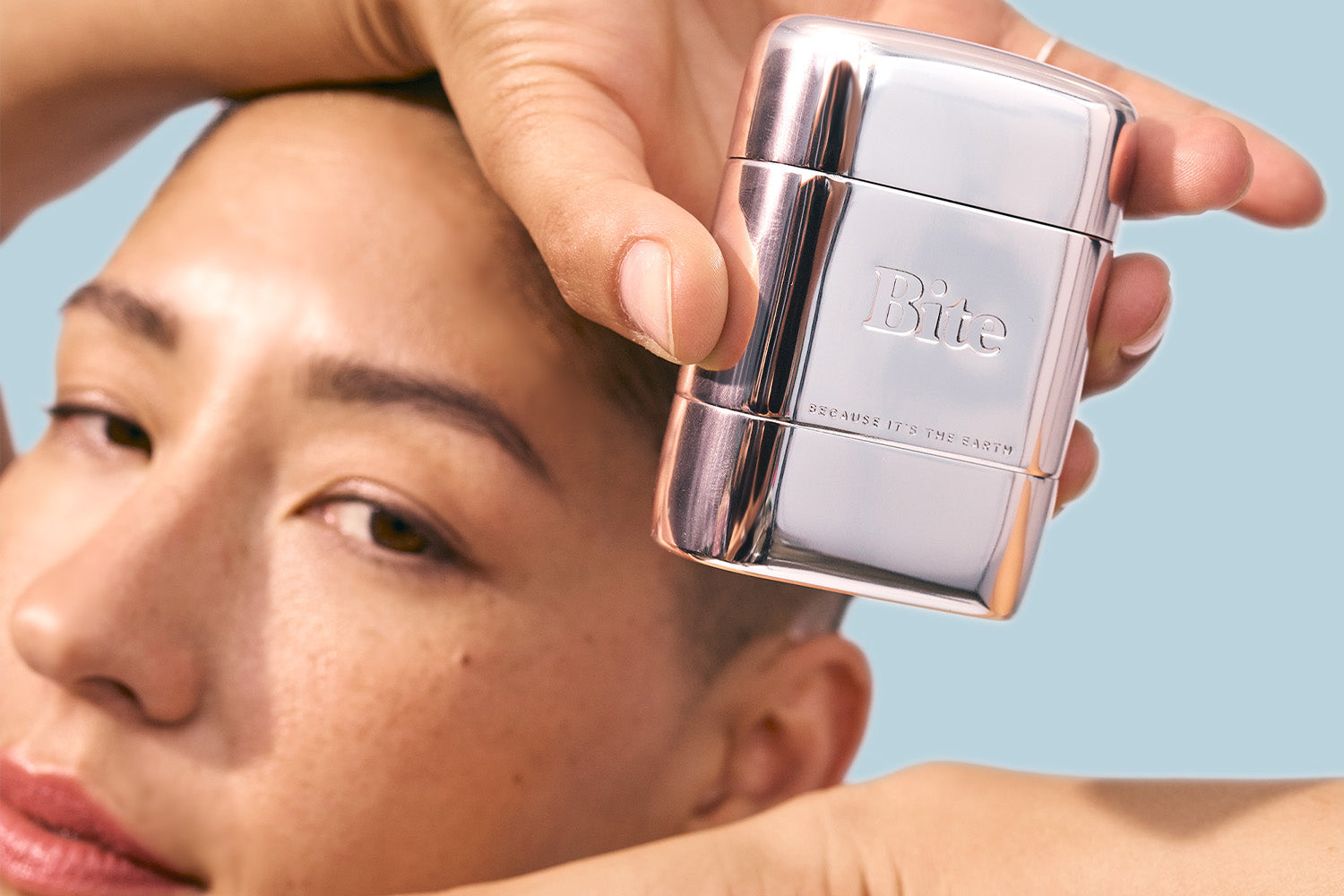Coconut Oil for Skin: What Are the Benefits?
When it comes to your skincare routine, chances are you seek out ingredients that not only serve as skin-supporting superstars but also feel great while doing so. After all, if you’re taking the time to care for your skin, you want it to be a routine that you can look forward to each day.
And here at Bite, we’re happy to report that coconut oil offers this all–and then some!
While you may have seen coconut oils and coconut oil products lining the shelves at stores and pharmacies, you may have some questions about what the benefits of coconut oil on the skin are, if coconut oil is right for your skin type, and how to incorporate this oil into your skincare regimen.
We are always thrilled to discuss steps we can take to enhance our wellness routines, so let’s dive into it!
What Is Coconut Oil?
The nutrient-rich coconut oil is derived from the fruit of the coconut palm, also known as the Cocos nucifera, a tropical tree native to Southeast Asia.
The bulk of the hearty fruit is made up of slightly sweet, white, and fleshy coconut meat or kernel. Coconut oil is extracted straight from the meat.
This multipurpose oil is chock-full of saturated fats. This gives the oil a thick, solid texture at room temperature but allows it to melt when warmed to body temperature, meaning it will feel like a luxurious dream when massaged into the skin.
The main fatty acid found in coconut oil is lauric acid. Coconut oil also contains smaller amounts of palmitic acids, linoleic acids, stearic acid, monounsaturated fats, and polyunsaturated fats.
What really sets coconut oil apart from other vegetable oils is that it is rich in medium-chain triglycerides (MCTs), a type of saturated fat made of shorter chemical structures that can be easily and quickly absorbed into the body.
When consumed, MCTs are quickly used as an energy source and are thought to help boost brain function and support heart health.
When applied topically to the skin, the quickly-absorbed MCTs can provide a wide range of benefits.
What Are the Benefits of Coconut Oil for Skin?
The unique molecular makeup of coconut oil can help replenish the skin in a number of important ways.
Hydrates the Skin
The nourishing fatty acids in coconut oil work as an emollient, sealing water into the skin. As the lauric acid and MCTs are absorbed into the skin, they aid with water loss prevention in the skin barrier.
The soothing hydration provided by coconut oil makes it a wonderful moisturizing ingredient that can help keep your skin smooth, soft, and glowing.
Prevents Dryness
Say goodbye to chapped and flaking skin!
Thanks to coconut oil’s moisturizing properties, you can use coconut oil to prevent dry skin — and the discomfort that comes with it.
Locking in moisture and boosting water retention makes your skin less likely to dry out, saving you from the associated irritation, itchiness, redness, and breakage.
One study found that extra virgin coconut oil was even more effective at soothing irritated skin than mineral oil, a type of oil made from petroleum (aka fossil fuels).
Here at Bite, we firmly believe that our well-being is intrinsically tied to the environment's well-being, and supporting one never has to come at the cost of the other.
You’ll find natural ingredients like coconut oil — which requires a much lower carbon footprint to produce than petroleum-based oils — in our deodorants: they’re better for the earth and better for your skin.
Supports the Lipid Barrier
We don’t always give much thought to our lipid or skin barrier, but this part of the body plays a vital role in keeping us safe and balanced every second of the day.
While the outer layer of skin feels soft and malleable, it actually behaves like a fortress to protect the body from external harm. Think of the skin cells as the building blocks of the fortress and the lipids (or fatty acids) as the cement that keeps them sturdy and secure.
Without the proper amount of fatty acids to help provide a moisture-retaining seal around the skin, that protective fortress is more likely to sustain cracks and damage.
If you’ve ever had your skin crack or become irritated in the cold, you’ve experienced the unpleasant results of a faulty fortress.
Without enough hydration, the skin barrier weakens and is less able to protect the body from external harms such as pollutants, bacteria, or allergens. But with so many different types of fatty acids, coconut oil can help replenish lipid content in the skin to boost skin barrier function and keep your skin feeling good as can be.
May Reduce the Appearance of Wrinkles and Fine Lines
As if all of the nourishing fatty acids weren’t enough, coconut oil also contains vital and antioxidant-rich B vitamins, minerals, and phenolic compounds.
Antioxidants play a mighty role in reducing physical signs of aging as they protect the body from oxidative stress caused by free radicals.
Oxidation can damage skin cells and break down the skin’s collagen, a protein responsible for helping the skin maintain its elasticity and firmness. When there is less collagen in the skin, wrinkles, lines, and age spots become more apparent. These signs of aging also tend to be more visible when the dehydrated skin.
The good news is that coconut oil can tend to both of these problems at once to keep your skin looking young, plump, and luminous.
While the MCTs get to work locking in moisture to rehydrate the skin, gallic acid, caffeic acid, salicylic acid, and p-coumaric acid can combat help reduce cell oxidation, boost collagen levels, and keep signs of aging at bay.
Contains Antibacterial Properties
The lauric acid and MCTs found in coconut oil have antibacterial properties that can further support your skin barrier in warding off bacteria and infections.
The naturally soothing properties of lauric acid can help ease discomfort associated with certain skin conditions such as atopic dermatitis, psoriasis, or eczema. And since lauric acid makes up almost 50% of the medium-chain fatty acids in coconut oil, it’s no surprise this skincare superstar is a go-to when it comes to promoting skin health and providing fast relief.
We use coconut oil in our deodorant to help prevent bacterial growth so you can smell fresh all day.
Gentle on Sensitive Skin
Coconut oil can work as a natural and soothing alternative to harsh chemicals used in commercial skincare products that are known to irritate and disrupt healthy skin function, such as sulfates and phthalates.
Coconut oil’s smoothing and hydrating abilities make it the perfect, gentle inclusion in skincare.
May Help Even Out Skin Tone
For most skin types, coconut oil is even gentle enough to use on the face, where its anti-swelling and anti-bacterial properties may help reduce the appearance of blemishes and breakouts. Lauric acid, in particular, is believed to help prevent the growth of certain types of bacteria associated with acne.
However, some people with oily skin may find coconut oil too heavy to use directly on the face as part of a leave-on or overnight treatment, as it can clog the pores.
Learning more about different skincare ingredients and your own skincare needs can help you decide what is right for you and your skin!
Are There Different Types of Coconut Oil?
Coconut oil can be found in three forms: refined, unrefined, and liquid.
Liquid coconut oil is most commonly used for cooking, while skincare products may rely on either refined or unrefined coconut oil.
When looking for coconut oil for your skin, unrefined coconut oil will generally be your best bet. Unrefined coconut oil is made by pressing the flesh of the coconut and typically doesn’t include any added chemicals.
On the other hand, refined coconut oil often undergoes a chemical process that can diminish the quality of the fatty acids and reduce the overall effectiveness, not to mention introduce chemicals that may irritate the skin.
Does Coconut Oil Have Any Side Effects for Skin?
Coconut oil is considered very safe for all skin types, including sensitive skin.
That being said, if you have oily or acne-prone skin, you may want to avoid leaving coconut oil directly on the face.
Allergic reactions to coconut oil are very rare, but if you are allergic to coconuts, walnuts, or hazelnuts, it's best to speak with your healthcare professional or dermatologist to make sure using coconut oil is safe for you and your skin.
How Can I Use Coconut Oil for Skin?
Coconut oil is an extremely versatile vegetable oil found in body lotions, serums, and face washes, or incorporated with other natural ingredients to create a lip balm or exfoliant (you can even make a delightful DIY exfoliant by mixing coconut oil and brown sugar).
Coconut oil also makes a stellar natural makeup remover, as the medium-chain fatty acids can break up any water-resistant matter. Simply warm unrefined coconut oil in your hands, and slather the oil on your face until the makeup is cleared. This is a great natural and environmentally-friendly option for folks who are sensitive to some of the harsher chemicals found in commercial makeup removers.
Incorporate Coconut Oil Into Your Routine With Bite
Here at Bite, coconut oil plays a key role in our four aluminum-free deodorants. The coconut oil’s antioxidants and fatty acids help build up the skin barrier to reduce the risk of irritation or rashes in the delicate armpit area, while its antibacterial properties will also prevent and reduce the growth of odor-causing bacteria to keep you smelling fresh all day long.
We pair coconut oil with wetness-absorbing tapioca starch, hydrating jojoba oil, and soothing vitamin E. Together, these natural ingredients keep the underarms smooth, soft, and odor-free — without the use of potentially harmful endocrine disruptors and skin irritants like aluminum, parabens, or sulfates.
Our deodorants are as friendly to the environment as they are to our skin.
With safe and naturally-derived ingredients, our deodorants are free of any petroleum-based ingredients or packaging.
Our deodorant comes in a 100% plastic-free refillable case, refills are compostable, and all orders are sent in plastic-free packaging with carbon-neutral shipping.
So when you’re feeling good treating your pits to soothing and safe ingredients, you can also feel good knowing you’re helping stop 15 million pounds of deodorant packaging from going into our landfills and oceans each year. The small changes add up!
Bottom Line
Coconut oil is a fatty, nutrient-rich vegetable oil that can be used in cooking, hair care, and skincare.
At Bite, we use coconut oil in our deodorants to keep your skin feeling soft, fresh, and clean. Our deodorant is safe for all skin types and safe for the environment.
Sources:
Coconut oil consumption and cardiovascular risk factors in humans | PMC



